|
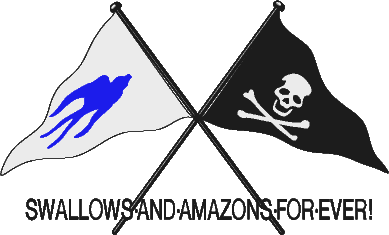
The
first quarter of 'Swallows and Amazons' left me wondering what all the
fuss was about. Regardless, I soldiered on and am I glad that I did.
This was a terrific story that took me right back to my childhood and at
the same time reminded me that I was a pretty good uncle. It left me in
tears when they all went back to school after such a brilliant adventure
- because we all know that those lovely holiday acquaintances will never
be kept up - that was it. Sniff.
Arthur Michell Ransome (18 January 1884 – 3 June 1967) was an English author and journalist, best known for writing the Swallows and Amazons series of children's books. These tell of school-holiday adventures of children, mostly in the Lake District and the Norfolk Broads. Many of the books involve sailing; other common subjects include fishing and camping. The
books remain so popular that they provide a basis of a tourist industry around Windermere and
Coniston Water
- the two lakes that Ransome used as the basis for his fictional North Country lake.
He also wrote about the literary life of London, and about
Russia before, during, and after the revolutions of 1917.
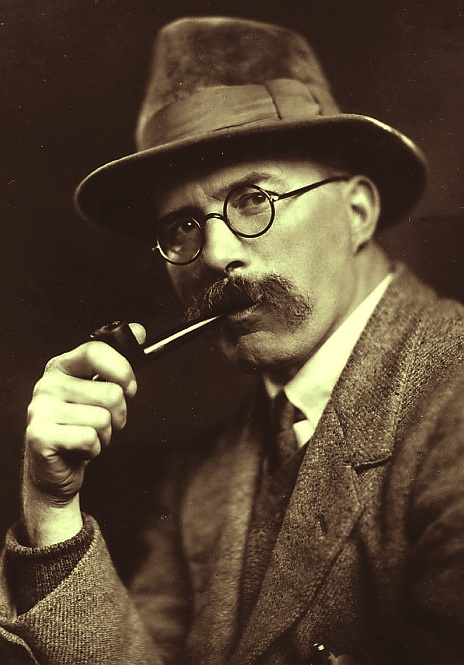
Early life
Ransome was born in
Leeds; the house at 6 Ash Grove, in the Hyde Park area, has a blue plaque over the door commemorating the
event. Ransome's father was professor of history at Yorkshire College, Leeds. His father's death in 1897 had a lasting effect on Ransome.
Ransome received his formal education first in Windermere and then at Rugby School (where he lived in Lewis Carroll's study room) but did not entirely enjoy the experience, due to his poor eyesight, lack of
athletic skill, and limited academic achievement. He attended Yorkshire College, his father's college, studying chemistry. After a year, he abandoned the college and went to London to become a writer. He took low-paying jobs as an office assistant in a publishing company and as editor of a failing magazine, Temple Bar Magazine, while writing and becoming a member of the literary scene of London.
Early writing, including life in Russia
Some of Ransome's early works were The Nature Books for Children a series of children's books commissioned by publisher Anthony Treherne. Only three of the six planned volumes were published before the publisher went
bankrupt. They have recently been made available in PDF format on the All Things Ransome
website.
In his first important book, Bohemia in London (1907), Ransome introduced the history of London's bohemian literary and artistic communities and some of its current representatives. A curiosity in 1903 about a visiting Japanese poet, Yone Noguchi, led to an ongoing friendship with Japanese painter (and Chelsea neighbour) Yoshio Markino, who in turn introduced him to the bohemian circle of Pamela Colman Smith.
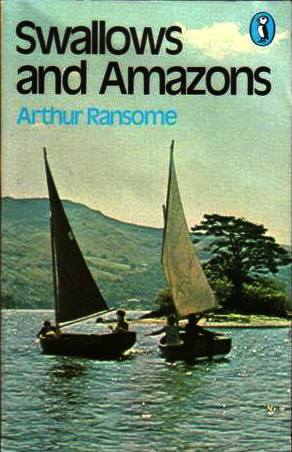
Ransome married Ivy Constance Walker in 1909 and they had one daughter, Tabitha. It was not a happy marriage: Ransome found his wife's demands to spend less time on writing and more with her and their daughter a great strain and, as Ransome's biographer Hugh Brogan notes, "...it was impossible to be a good husband to Ivy". They divorced in
1924.
Among his other books, one on Oscar Wilde embroiled him in a libel suit with Lord Alfred Douglas His wife Ivy attended the trial, sitting in the public gallery as Ransome would not let her sit beside him. Her apparent enjoyment of the public notoriety the case attracted added to the stress on their
marriage. The publisher Daniel Macmillan dined with Arthur and Ivy every day during the trial so that Ivy could not quarrel with
Arthur. Ransome won the suit, but suppressed the contentious text from subsequent editions of the Wilde biography. Adding to Ransome's "wretched" thirteen months waiting for the case to come to trial was the action of his publisher, Charles Granville. Wilde had been prepared under the guidance of publisher Martin Secker, but Granville had promised better returns and Secker agreed to release the rights. In exchange for a promise of a guaranteed income Ransome handed Wilde over to Granville. The work was well received and successful, running to eight editions, but Ransome saw little in return; in 1912 Granville was charged with embezzlement and fled the country, leaving Ransome to struggle even to register himself as a
creditor of Granville's ruined company. Furthermore, his neglect of his health—he suffered from piles from sitting too long in wet
boats, and a stomach ulcer—had been exacerbated by the pressure of defending the legal
action.
Swallows
and Amazons - Film trailer Youtube
Old Peter's Russian Tales: cover and illustrations by D. Mitrohin. In 1913 Ransome left his wife and daughter and went to Russia to study Russian folklore. In 1916, Ransome published Old Peter's Russian Tales, a collection of 21 folktales from Russia. After the start of
World War I in 1914, he became a foreign correspondent and covered the war on the Eastern Front for a radical newspaper, the Daily News. He also covered the Russian revolutions of 1917, developed some sympathy for the Bolshevik cause and became personally close to a number of its leaders, including Vladimir Lenin and Leon Trotsky. He met the woman who would become his second wife, Evgenia Petrovna Shelepina, who at that time worked as Trotsky's personal
secretary.
Ransome provided some information to British officials and the British Secret Intelligence Service (then known as MI1c), which gave him the code name S76 in their
files. In October 1919 Ransome met Rex Leeper of the Foreign Office's Political Intelligence Department, who threatened to reveal this unless Ransome privately submitted his articles and public speaking engagements for approval. Ransome's response was
"indignant". MI5, the British Security Service, kept watch on him because of his opposition to the Allied intervention against the Russian
Revolution. On one of his visits to the United Kingdom, the authorities searched and interviewed him and threatened him with arrest.
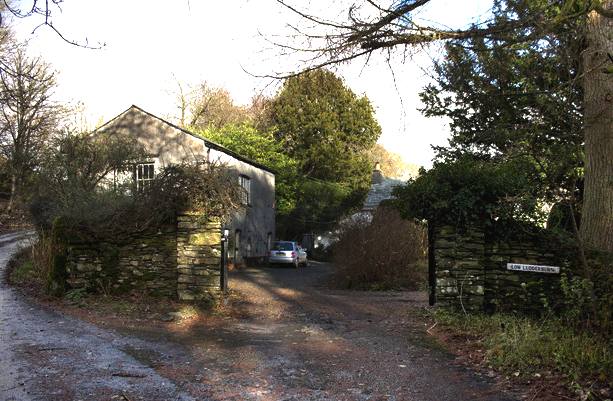
Arthur Ransome's home, Low Ludderburn near Bowland Bridge in Cumbria
In October 1919, as Ransome was returning to Moscow on behalf of The Manchester Guardian, the Estonian foreign minister
Ants Piip entrusted him to deliver a secret armistice proposal to the Bolsheviks. At that time the Estonians were fighting their War of Independence alongside the White movement of counter-revolutionary forces. After crossing the battle lines on foot, Ransome passed the message, which to preserve secrecy had not been written down and depended for its authority only on the high personal regard in which he was held in both countries, to diplomat Maxim Litvinov in Moscow. To deliver the reply, which accepted Piip's conditions for peace, Ransome had to return by the same risky means, but this time he had Evgenia with him. Estonia withdrew from the conflict and Ransome and Evgenia set up home together in the capital Reval
(Tallinn).
After the Allied intervention Ransome remained in the Baltic states and built a cruising yacht, Racundra. He wrote a successful book about his experiences, Racundra's First Cruise. He joined the staff of The Manchester Guardian when he returned to Russia and the Baltic states. Following his divorce, he married Evgenia and brought her to live in England, where he continued writing for The Guardian, often on foreign affairs, and also writing the "Country Diary" column on fishing.
By 1937, MI5 appeared satisfied of Ransome's loyalty to Britain. However, evidence uncovered in the KGB files following the break-up of the Soviet Union seems to indicate that Evgenia Ransome, at least, was involved in smuggling diamonds from the Soviet Union to Paris to help fund the
Comintern. The topic is discussed in a 2009 book by Roland Chambers, The Last Englishman: the Double Life of Arthur
Ransome.
Re-launch
of the Swallow - Youtube
The Swallows and Amazons
series
Ransome settled in the Lake District. He decided not to accept a position as a full-time foreign correspondent with the
Guardian and instead wrote Swallows and Amazons in 1929—the first of the series that made his reputation as one of the
best English writers of children's books.
Ransome apparently based the Walker children (the "Swallows") in the book in part on the Altounyan family: he had a long-standing friendship with the mother and Collingwood grandparents of the Altounyans. Later he denied the connection, claiming he only gave the Altounyans' names to his own characters; it appears to have upset him that people did not regard the characters as original creations.
Ransome's writing is noted for his detailed descriptions of activities. Although he used many actual features from the Lake District landscape, he invented his own
geography, mixing descriptions of different places to create his own juxtapositions. His move to East Anglia brought forth a change of location for four of the books and Ransome started using the real landscape and geography of East Anglia so that it is possible to use the maps printed in the books as a guide to the real area. Ransome's own interest in sailing and need to provide an accurate description caused him to undertake a voyage across the North Sea to Flushing. His book We Didn't Mean To Go To Sea reflects this, and he based the fictional Goblin on his own boat Nancy Blackett (which in turn took its name from a character in the series).
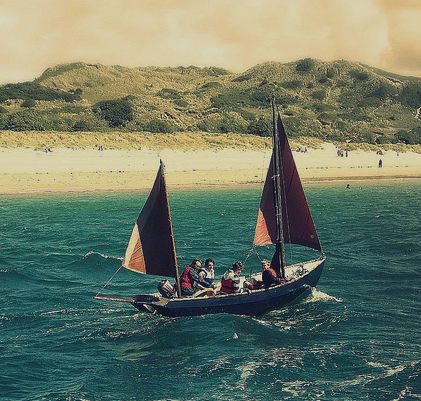
Swallow
sailing boat on the lake
Two (or possibly three) of the "Swallows and Amazons" books have less realistic plots. The original concept of Peter
Duck was a story made up by the children themselves, but Ransome dropped the introductory passage explaining this from the book before it was published (though Peter Duck himself features in Swallowdale as a character whom the children created). Peter Duck is a relatively straightforward story, but with a much more fantastic plot than the more conventional "Swallows and
Amazons" books.
A trip to China as a foreign correspondent provided Ransome with the imaginative springboard for Missee Lee, a story in which readers find the Swallows and the Amazons sailing around the world in the schooner Wild Cat from Peter Duck. Together with
Captain Flint (the Amazons' uncle Jim Turner), they become the captives of Chinese pirates.
More controversy attaches to the final book of the series, Great Northern?, set in
Scotland. The plot and action appear realistic, but the internal chronology does not fit the usual run of school holiday adventures. Myles North, an admirer of Ransome, provided much of the basic plot of the book.
The Autobiography of Arthur Ransome, edited by Rupert Hart-Davis was published posthumously in 1976. It only covers his life up to the publication of Peter Duck in 1931.
"Swallows and Amazons" was so popular that it inspired a number of other authors to write in a similar vein: most notably two schoolchildren, Pamela Whitlock and Katharine Hull wrote The Far-Distant Oxus, an adventure story set on Exmoor. Whitlock sent the manuscript to Ransome in March 1937; he persuaded his publisher Jonathan Cape to produce it, characterising it as "the best children's book of
1937".
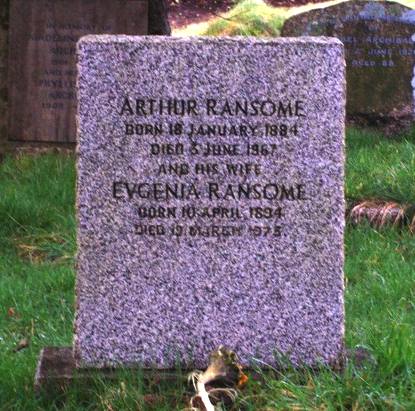
Ransome and his wife Evgenia lie buried in the churchyard of St Paul's Church,
Rusland, Cumbria, in the southern Lake District.
Awards and appreciation
Ransome has been honoured in many countries. In 1953 he was appointed
CBE. Durham University made him an honorary Doctor of Letters. He was the first winner of the prestigious Carnegie Medal for children's literature, for Pigeon Post in 1936. Translations of his books have appeared in a number of languages. As a result, Ransome became popular in countries such as Japan and the former
Czechoslovakia. Thriving Ransome appreciation societies exist in Japan and the Czech Republic. The Arthur Ransome Club was founded in
Japan in 1987, and three years later The Arthur Ransome Society, which now has a worldwide membership, was founded in the United Kingdom in 1990. Czech astronomer Antonín Mrkos named an asteroid after the author (6440 Ransome).
Swallows
and Amazons - 1974 EMI Film clip Youtube
Bibliography
The Child's Book of the Seasons (1906)
Pond and Stream (1906)
The Things in our Garden (1906)
Bohemia in London (1907)
The Book of Friendship (1909)
Edgar Allan Poe (1910)
The Book of Love (1911)
Oscar Wilde (1912)
Old Peter's Russian Tales (1916)
Six Weeks in Russia (1919)
The Crisis in Russia (1921)
Racundra's First Cruise (1923)
Rod and Line (1929)
Mainly about Fishing (1959)
[edit] "Swallows and Amazons"Swallows and Amazons (published 1930)
Swallowdale (1931)
Peter Duck (1932)
Winter Holiday (1933)
Coot Club (1934)
Pigeon Post (1936)
We Didn't Mean To Go To Sea (1937)
Secret Water (1939)
The Big Six (1940)
Missee Lee (1941)
The Picts and the Martyrs: Or Not Welcome At All (1943)
Great Northern? (1947)
Coots in the North (unfinished at the time of Ransome's 1967 death, published in an unfinished form in 1988 with some other short works)
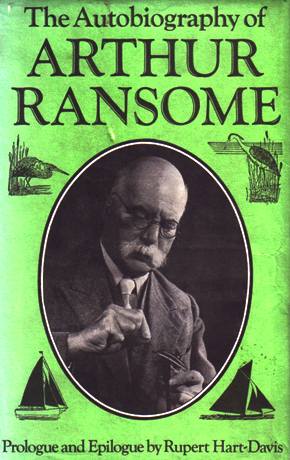
Arthur Ransome's
autobiography
NOVELIST
INDEX
A - Z
Many
traditional rules of publishing have been superceded by the long awaited
advent of electronic publishing, such as for the ipad or
e-kindle readers.

A
taste for adventure

A
heartwarming adventure for Swallows and Amazons:
Pirate
whalers V Conservationists
|






